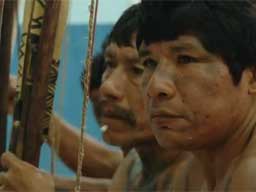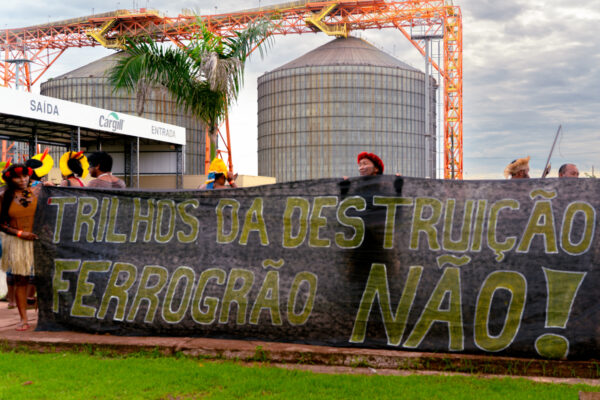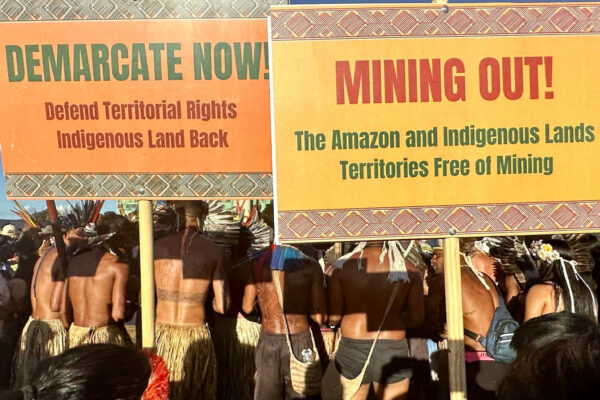Altamira, Brazil – Indigenous communities of the middle Xingu ended their occupation of the Belo Monte dam’s main cofferdam following two days of talks with the company Norte Energia. The 21-day occupation forced the company to halt construction on the cofferdam. The action brought a notable level of national and international visibility to the concerns of local people over the project’s impacts on their health, livelihoods and environment, and forced the Brazilian government and Norte Energia to take these concerns seriously.
However, the talks failed to address the key demands of indigenous peoples relating to access to navigate the river around the dam, loss of fish and livelihoods, land demarcation, health and education programs, among others. During the talks with each ethnic group, Norte Energia offered each community a package of “trinkets” such as TVs, boats, cameras, and computers while refusing to commit to a timetable for meeting the legally required social and environmental conditions.
The Xikrin people, the largest and most influential of the nine tribes who have been occupying the Pimental cofferdam, agreed to stop the occupation after a series of confusing and poorly translated sessions with Carlos Nascimento, President of Norte Energia. Other indigenous groups decided that without the Xikrin warriors, they would end the occupation and seek other avenues of claiming their rights. Norte Energia asked these groups to return for more talks next Monday.
Many participants, especially those from the Arara and Juruna indigenous peoples of the Big Bend region of the Xingu River who will be most directly affected by Belo Monte, held the government agency FUNAI responsible for failing to protect their interests and their rights in these negotiations. FUNAI and Brazil’s environmental agency IBAMA were conspicuously absent from the negotiations, a fact contrasted by their current discussions in Brasilia about whether or not to authorize the final diversion of the river’s flow, which will reduce the Big Bend by as much as 80%.
While the occupation has ended for the time being, many indigenous leaders who were at the occupation vowed to continue the battle for the future of their communities and their river.
The following videotaped statements were made by key people involved in the negotiations and can be previewed online and downloaded here (Note: This file is 120 MB):
Biviany Rojas, Lawyer with the Brazilian organization Instituto Socioambiental – ISA
“The negotiation process was unequal, totally asymmetric. You have a multibillion-dollar company sitting up in front of various indigenous groups who are being divided and that the company makes up the rules of the negotiations, as it likes without any intervention by the government who is mostly absent from the entire process. The company divides the people by groups and by tribes, the first one being the Xikrin, who are the strongest, a group who were relatively recently contacted and who don’t speak Portuguese very well. So the company hires translators and the words of the translators are added to those of the people and relayed to the President of the company.”
Leiliane Jacinto Pereira Juruna, from Miratu Community
“I am disillusioned with the outcome of the negotiations. They want to buy us off cheaply. This is not anything, what we want is guarantees of our rights and the conditions that are not being complied with. FUNAI gave the license to IBAMA who then authorized the company Norte Energia. Construction marches forward but none of the conditions are met. Things became difficult. FUNAI needs to support us more.”
Marizan Félix Juruna, Chief of Paquicamba Community
“Everyone knows that the conditions were supposed to be completed before the dam that blocks the river was completed. This did not happen. None of the conditions have been complied with before the project started.”
Jailson Juruna, from Miratu Community
“Nothing has been resolved. I have the same concerns. We put forth the same proposal we had presented at the first meeting and they kept touching on things and changing the subject. The talks ended with no agreement with our communities. I don’t think it is just how they are treating us the indigenous people, especially us from Big Bend region. Our communities are directly affected.”














